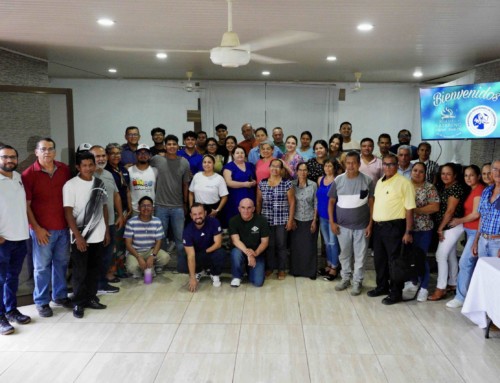By: M.Sc. Maureen Rebeca Martínez Abarce.
Introduction
Transcendental intelligence is the capacity to connect with the divine, also called the spiritual or transcendent. This intelligence goes beyond cognitive and emotional skills and relates to the search for meaning, purpose, and connection with something greater than oneself. Like cognitive, intellectual, and emotional intelligence, transcendental intelligence can be stimulated through techniques connecting children with God, themselves, and others. Therefore, it is essential to emphasize the creation of environments within the church and home to stimulate transcendental intelligence, guided by the Holy Spirit, as the foundation upon which children can make assertive decisions.
The Intelligences and Their Importance in Learning
“Train a child in the way he should go, and when he is old, he will not turn from it.”
Proverbs 22:6
The early years of life are crucial, as they are characterized by rapid spiritual, physical, mental, social, and emotional development. The comprehensive education of children must consider pedagogical and neurological components, including different intelligences. Currently, the relevance of three main types of intelligence is recognized:
- Cognitive Intelligence:
- This capacity allows for the acquisition, processing, and understanding of information. It is fundamental for academic learning and problem-solving.
- Emotional Intelligence:
- The ability to recognize, understand, and regulate our own emotions, as well as the capacity to empathize with the emotions of others, is essential for interpersonal relationships and emotional well-being.
- Transcendental or Spiritual Intelligence:
- This intelligence goes beyond the other two. It allows us to make assertive decisions and use our skills for the common good.
Figures like Socrates and Plato stood out for their cognitive intelligence. Others, like Daniel Goleman, have delved into emotional intelligence. There are also leaders with remarkable cognitive and emotional skills who have used their potential for harmful purposes, such as Joseph Goebbels (Nazi ideologist), Bernie Madoff (fraudster), or Osama Bin Laden (Saudi terrorist).
What differentiates these figures? Transcendental intelligence. Thus, it is crucial to develop it, as it exists at a higher level and encompasses the other intelligences.
Ramón Gallegos Nava, in his book “Spiritual Intelligence,” mentions the importance of these three types of intelligence and refers to them as follows:
- Spiritual Intelligence: Relates to being and the understanding that there is a supreme being.
- Emotional Intelligence: Relates to the body and the capacity to feel.
- Cognitive Intelligence: Relates to the brain and the capacity to think.
It is important to note that emotional intelligence does not provide moral or ethical direction for behavior; it only enables emotional control. On the other hand, intellectual intelligence, rooted in the brain, is based on logical and cognitive processes, but it only sometimes grasps the overall meaning of situations.
Cultivating transcendental intelligence allows us to go beyond cognitive and emotional realms, guiding our decisions based on Christian spirituality’s beliefs, principles, and ethics, which give profound meaning to our existence. The brain is created to connect with a supreme being or higher power, and when a person finds themselves in a situation where there is no human solution, they turn to our God.
How Can We Stimulate Transcendental Intelligence in Churches?
In my professional practice with children aged 6 to 12, I have learned to stimulate different intelligences using methodologies where the child is the protagonist of their learning. We, as teachers, are called to create environments that stimulate talents and gifts for serving God and others. Our goal is not just to conduct classes for children to learn about biblical characters, stories, or parables but to help them relate that knowledge as a foundation for making assertive decisions or creating habits. These activities can be small or large, depending on the age of the students. The objective is for children to understand that God has endowed them with gifts and talents to help others and share the message of salvation with those who do not yet know it. Our task is to support the child in recognizing that we are multidimensional beings who interact in three directions:
- Towards the Inside:
- This involves having a personal relationship with God, stimulating a love for Him, and understanding their identity as perfect creations of God, conceived as unique creations with purposes beyond material acquisition. They must learn about biblical characters and their stories and internalize and apply those principles daily.
- Towards the Outside:
- This refers to the ability to generate awareness of how one interacts with the surrounding world (the environment). It goes beyond mere coexistence. Children must learn to serve others, be compassionate, and share the message of salvation. Biblical stories can be powerful tools for teaching these values and reinforcing learning through social projects that allow them to put their learning into practice.
- Towards Others:
- Our relationships with the people around us are also essential. According to Jesus in Matthew 22:37-39, the second commandment urges us to love our neighbor as ourselves. Biblical stories, such as parables and miracles of Jesus, should connect with the three intelligences mentioned, thereby stimulating the resolution of everyday problems and making assertive decisions from a perspective that considers our relationship with God, ourselves, and others. We are challenged to innovate in our lessons and build learning experiences using innovative strategies or techniques.
Conclusion
Transcendental intelligence is essential for a fulfilling life. Combining it with other intelligence and creating a supportive environment can prepare our children to make assertive decisions and grow in their relationship with God and others. The work of teachers should relate to an integral stimulus for growth, not merely dedicating time to narrate a biblical story and an artistic activity. Additionally, exploring new strategies, methodologies, and techniques that break outdated paradigms will be vital to support, contextualize, and respond to the needs of children today. Times of activity with children in the church go beyond mere coexistence; they are not just about transmitting information but about ensuring that children internalize spiritual principles. Meaningful learning translates into fundamental changes in the mind and heart. It is crucial that what is learned in Sunday School is applied at home and daily life.
Bibliography:
- Inteligencia Espiritual de Ramón Gallegos Nava https://www.monografias.com/trabajos82/inteligencia-espiritual-ramon-gallegos-nava/inteligencia-espiritual-ramon-gallegos-nava2.shtml
- Taken from: https://www.eoi.es/blogs/mintecon/2014/04/28/la-inteligencia-emocional/
- Taken from: https://www.canariasconfidencial.com/gran-canaria/autonocimiento/
- Taken from: http://www.ub.edu/grop/wp-content/uploads/2014/03/Las-competencias-emocionales.pdf
- Taken from: https://www.eoi.es/blogs/mintecon/2014/04/28/la-inteligencia-emocional/
- Taken from: http://www.ub.edu/grop/wp-content/uploads/2014/03/Las-competencias -emocionales.pdf
- Taken from: https://www.monografias.com/trabajos82/inteligencia-espiritual-educacion-holi sta/inteligencia-espiritual-educacion-holista2.shtml
- Taken from: https://es.slideshare.net/megfranco/taller-de-creatividad-43791474





